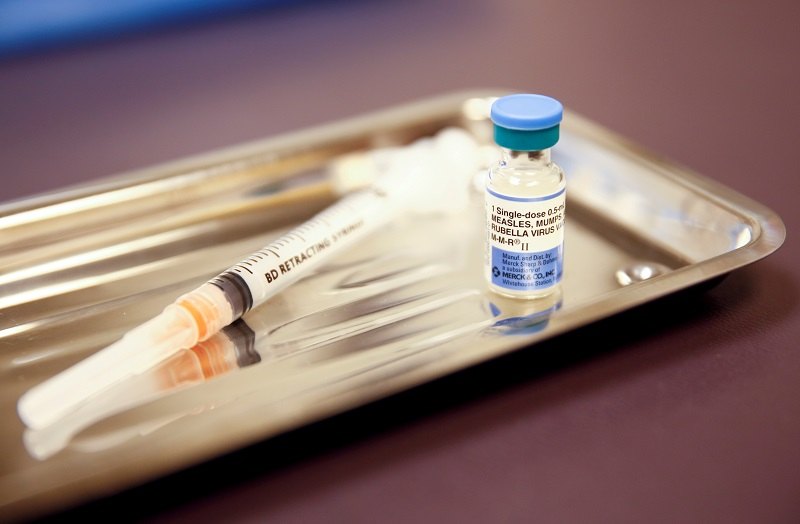
A vial of the measles, mumps, and rubella (MMR) vaccine
14:13 JST, April 19, 2021
A disruption in the supply of mumps vaccines has caused pediatricians and other medical institutions around the country to halt vaccinations, The Yomiuri Shimbun learned recently.
Because of trouble at a manufacturing plant of Takeda Pharmaceutical Co., one of two producers of the vaccine in Japan, medical experts have expressed concern that shortages could continue until autumn.
The mumps vaccination is not among the routine inoculations recommended by the government, and is given only to those who want to receive it.
The Japan Pediatric Society, however, recommends that children receive the vaccination twice, when they are 1 year old and just before they begin elementary school. In 2019, about 1.6 million people were inoculated.
According to Takeda, defects were detected in filters of equipment used to produce the undiluted solution of the vaccine during regular inspections conducted between January and April at its Yamaguchi Prefecture plant that manufactures the vaccine.
The company disposed of vaccines scheduled to be shipped following the inspections, with a company official saying, “It cannot be ruled out that [the filter problem] may have affected product quality.”
The company did not disclose how many doses of the vaccine was discarded, but said it expects stocks to run out by the end of this month. It said shipments will resume from late October.
Daiichi Sankyo Co.,, the other manufacturer of the vaccine, said it will look to pick up the slack.
“To lessen the impact of the vaccine shortages, we will try to make adjustments to the pace of shipping and our distribution areas.”
Regarding the situation, Tadashi Kataoka, a director of the nonprofit organization “Know VPD (vaccine preventable diseases)! Protect our Children,” said, “We will gather information and transmit it to parents via our website and other means.”
The Japan Pediatric Society has also begun considering a response to the situation.
Outbreaks of mumps infections occur every four or five years, mainly among children, and one out of every 1,000 people infected suffers serious hearing impairment.
The vaccine is believed to be 90% effective in preventing infection.
Top Articles in Society
-

Man Infected with Measles Reportedly Dined at Restaurant in Tokyo Station
-

Man Infected with Measles May Have Come in Contact with Many People in Tokyo, Went to Store, Restaurant Around When Symptoms Emerged
-

Woman with Measles Visited Hospital in Tokyo Multiple Times Before Being Diagnosed with Disease
-

Australian Woman Dies After Mishap on Ski Lift in Nagano Prefecture
-

Foreign Snowboarder in Serious Condition After Hanging in Midair from Chairlift in Nagano Prefecture
JN ACCESS RANKING
-

Japan PM Takaichi’s Cabinet Resigns en Masse
-

Japan Institute to Use Domestic Commercial Optical Lattice Clock to Set Japan Standard Time
-

Israeli Ambassador to Japan Speaks about Japan’s Role in the Reconstruction of Gaza
-

Man Infected with Measles Reportedly Dined at Restaurant in Tokyo Station
-

Videos Plagiarized, Reposted with False Subtitles Claiming ‘Ryukyu Belongs to China’; Anti-China False Information Also Posted in Japan




















